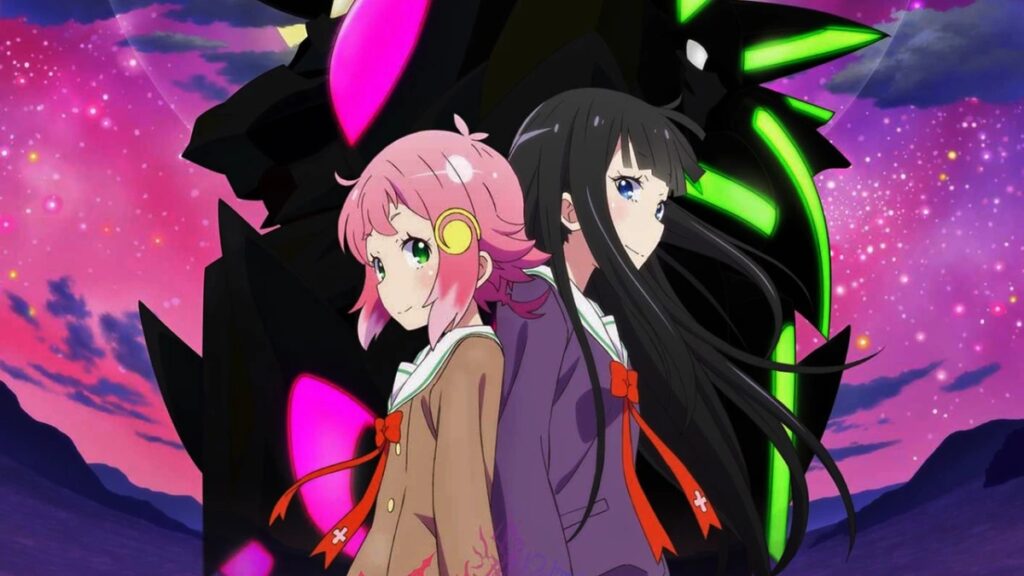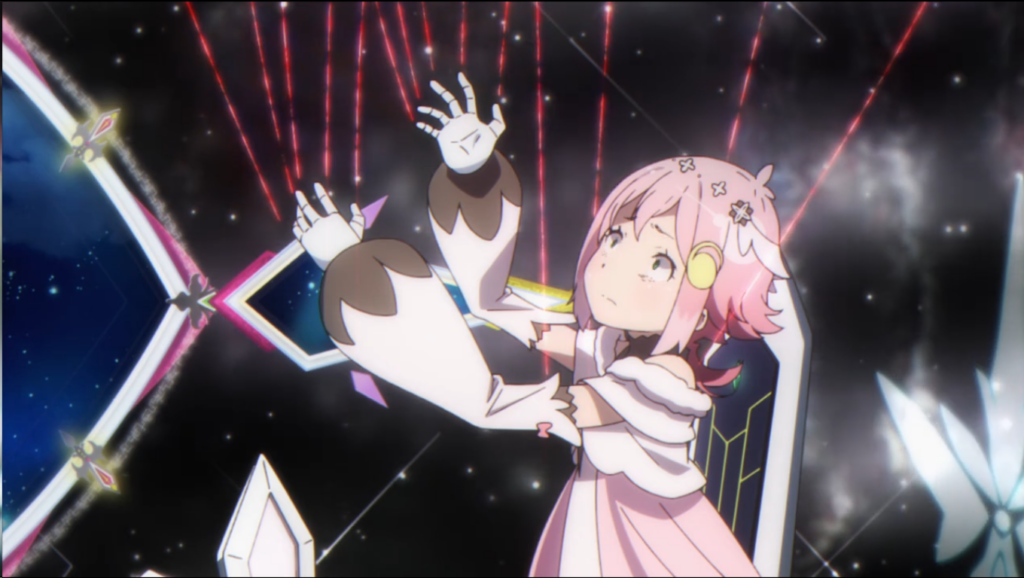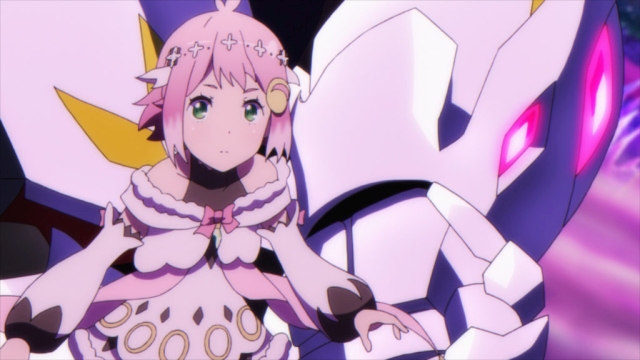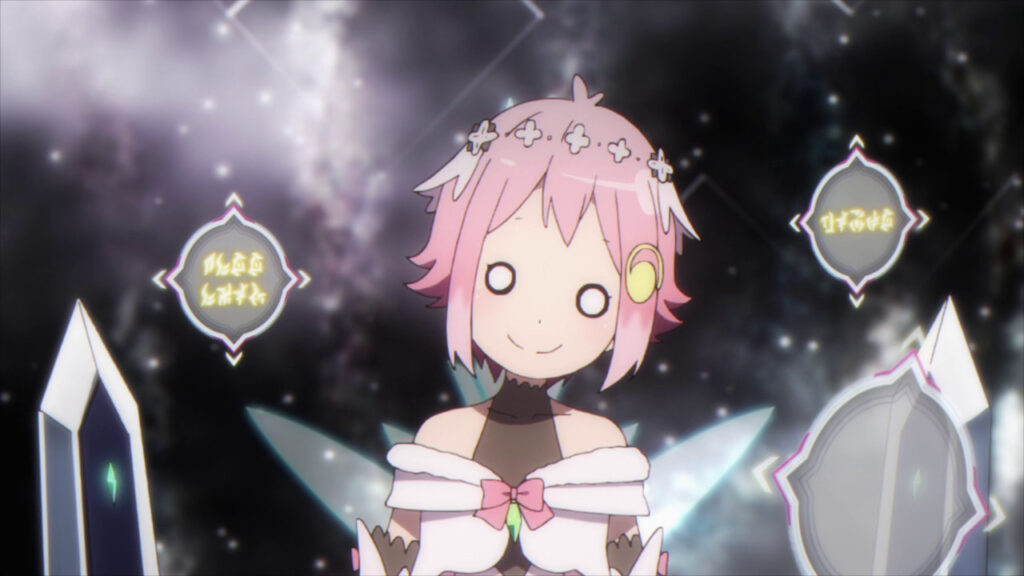Granbelm
February 10, 2024 · 1 comment
By Zoe Crombie.

Have you ever wondered what an anime series that combines the cute slice-of-life antics of magical girls with the spectacular action of giant mechs would look like? If so, then wonder no longer – Granbelm is the series for you, combining these evergreen anime subgenres with a surprising degree of success. Centred around a once-in-a-blue-moon tournament that determines who will be the one to keep the art of practicing magic alive in the modern world, this series has all the spectacle of a Gundam show with the pick-a-favourite fun that a cast of magical girls brings.
From its first episode, Granbelm holds nothing back, starting in media res as our protagonist Mangetsu heads to her school to grab a lunch bag only to stumble into a battle she’s entirely unequipped for between massive yet oddly chibi-fied mechs. Fortunately, she’s saved from magical annihilation at the hands of some bloodthirsty high-schoolers by the brooding Shingetsu, who explains the rules of the world: the winner of the tournament – or, the Princeps Mage of the Granbelm – gains control of the Magiaconatus, which contains all the magic in the world. As Mangetsu investigates her own mysterious connection to the event, she and Shingetsu bond over their lunar-themed names (Full Moon/New Moon), magic training, and determination to win the Granbelm and become a mage.

One of the most appealing elements of anime for those just getting into it is the uniqueness of many of its most popular genres. Unlike American cinema or TV that tends to be divided into comedy, drama, horror, romance, and more, anime is often more hyper-specific, at least in part due to the historical division by age range that’s also a contributing factor in deciding content: the rules aren’t hard and fast, but you’re more likely to find high-octane action in a shonen series, while a shojo series tends more towards personal relationships and melodrama.
That’s what makes Granbelm’s genre experimentation so fascinating – the synthesis of the two goes so much deeper than just moe girls in giant mechs. In fact, the fusing of the two genres is surprisingly smooth; they share tendencies like complex lore, narrative twists and turns, and otherworldly aesthetics, so it makes a surprising amount of sense to see in action. Though the girls each have a magic stone that enables their powers, you could even argue that their dedicated mechs, with names like White Lily and Viola Katze, function as the robotic equivalent of more conventionally magical objects like the wands in Sailor Moon or Cardcaptor Sakura’s cards.

The visuals of Granbelm also do a great job of utilising both of its main genre influences. Coloured with a palette of celestial blues and purples, punctuated by the neon tones of the Armanox mechs, it’s always a pleasure to look at, conveying the feeling of magic and grandeur promised by the plot. Though the character designs are fairly stereotypical, indicating what you’d expect from each girl – the girl with long dark hair is serious, the curvaceous woman is arrogant and brash, and so on – they’re effective nonetheless, with their outfits in particular working well to convey their attitude and motivation in the competition.
While it’s far from being totally self-serious, with a healthy but controlled amount of comedic moments in most episodes, Granbelm has more narrative turns than you may initially expect, with some genuinely shocking twists that play with the tropes of high school anime in particular. Again, this is one of the best parts of this hybrid anime – it doesn’t ride entirely on the novelty of its premise, and is able to craft an engrossing story beyond the promise of cute girls in massive mechs.

Granbelm currently also stands as the only entirely original work by the studio Nexus, who tend to produce adaptations of light novels – they should certainly branch out more often, as this anime reveals a great understanding of the appeal of the mode and the ability to pick and remix some of its more compelling tropes. It’s worth mentioning that it isn’t entirely novel, as the anime series Magic Knight Rayearth was made of a similar genre amalgamation in the early 1990s, but as an anime trying this in the 21st century, it certainly yields different results.
Anime genres are a fertile playground for experimentation even within fairly conventional series, and Granbelm is a fantastic example of this. With compelling characters, engaging mech fights, gorgeous ethereal visuals, and a plot that goes deeper than you may expect, this thirteen episode series tells a grand story in a short package, and is absolutely worth a watch.
Zoe Crombie is an associate lecturer and PhD candidate at Lancaster University working on Studio Ghibli. Granbelm is released in the UK by Anime Limited.
Mór
February 10, 2024 1:06 pm
Granbelm is a pretty good series, ans I liked the writing, but why is nobody talking about Mangetsu's hairclip looking like the Crunchyroll logo?